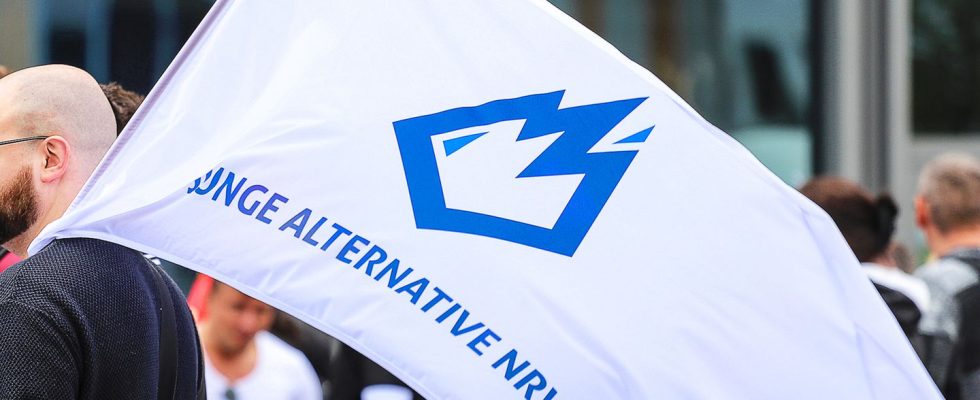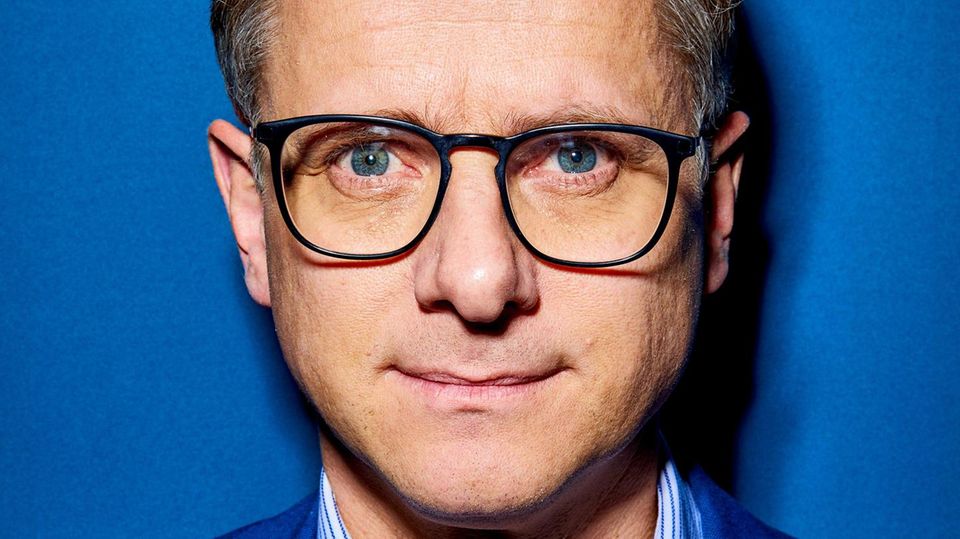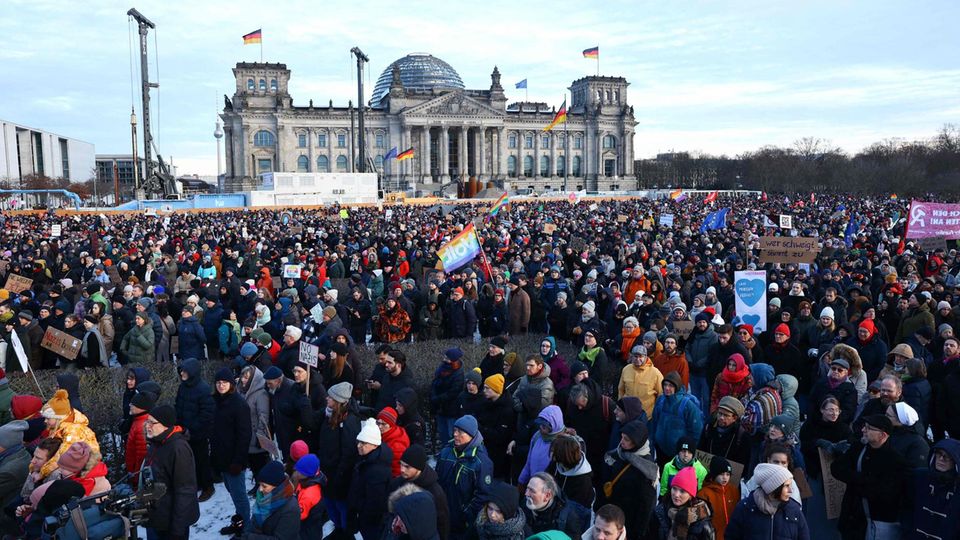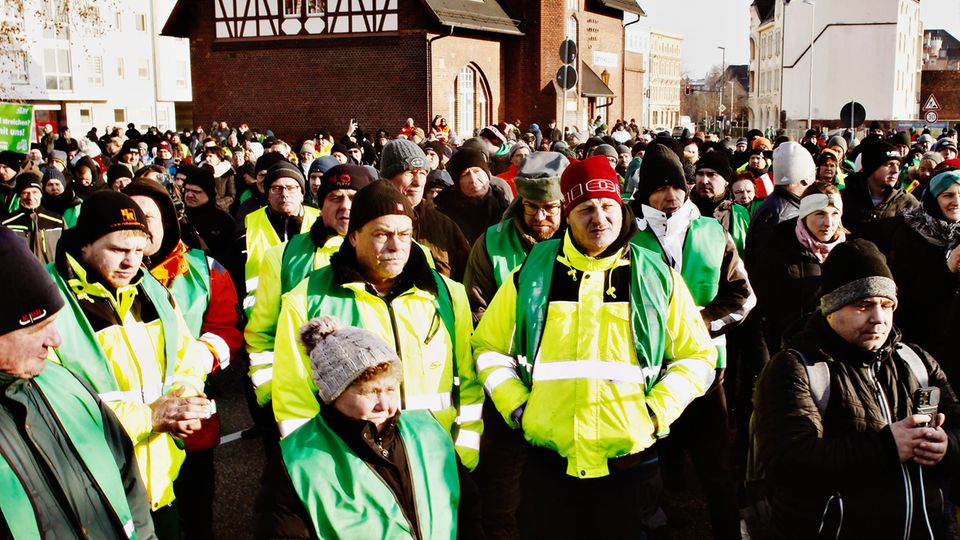AfD young people
Why a ban on Junge Alternative is now being discussed
A member of Junge Alternative (JA) – the youth organization of the AfD – at an election campaign event. The North Rhine-Westphalia Office for the Protection of the Constitution has classified the state association as a suspected right-wing extremist case.
© Alex Talash / DPA
Do we have to start with the Young Alternative (JA)? A ban on the AfD youth organization is now being discussed. There are essentially two reasons for this.
Felix A. Cassel has many questions. But basically it’s just one thing: what’s all the fuss about? The excitement surrounding the conspiratorial meeting between AfD politicians and right-wing extremists in Potsdam, at which the forcible expulsion of entire population groups was discussed under the euphemistic term “remigration”. The excitement that has led to a new debate about a ban on the far-right party. And their youth organization “Junge Alternative” (JA).
So Felix A. Cassel asks why this “long-known concept” of “remigration” is so suddenly framed as “deporation”. Thieving grin, ironic undertone, seen and heard in an online video. Cassel speaks of “exaggerated reports about a dinner together.” Assume that it was all “orchestrated”. And complains that the debate about banning the Junge Alternative is just the “gateway” to get the federal party banned.
The clip is introduced with the words: “Again calls for a ban. What’s behind it?” As if it were an explanatory video that clarifies the supposed facts. Although it downplays and marginalizes the right-wing extremist tendencies that are becoming more and more blatant in the parent party.
Cassel is chairman of the Junge Alternative Nordrhein-Westfalen. The association has recently been listed as a “suspected case” by the state Office for the Protection of the Constitution because there are “strong indications” that the JA “does not play according to democratic rules, but prefers its own right-wing extremist rules”. The Federal Office for the Protection of the Constitution had temporarily classified the entire youth organization as a right-wing extremist movement, but had to withdraw this again due to a lawsuit. Since then, the JA has again been listed as a suspected case. A decision in the litigation is expected this spring.
While the legal verdict is still a long time coming, the political verdict has already been partly made. Green Party co-leader Omid Nouripour called on Sunday for the Junge Alternative to be banned. In the fight against right-wing extremists, the constitutional state should not lose sight of the AfD’s “front organizations,” says Nouripour. These would play a crucial role in networking and increasing hatred and agitation. Thuringia’s Interior Minister Georg Maier from the SPD, who is also in favor of considering a ban on the entire AfD, shares Nouripour’s analysis. “As a first step, it makes perfect sense,” said Maier about a ban. Because not only the AfD, but also the JA is getting bigger and more aggressive.
There are essentially two reasons why there is now talk about banning the youth organization. Firstly: those who start with radical young people get to the root of the problem before it spreads further tendrils. At least that’s the hope. Second, a ban on JA may be easier to enforce.
The legal hurdles for banning a party are very high (Here you can read more about it), however, the Junge Alternative is not an independent party, but an association. In fact, Federal Interior Minister Nancy Faeser could ban the club. Faeser had told SWR that if all the requirements were met, a club could be banned. This is the more fundamental assessment of the SPD politician, who initially advocates a substantive debate with the AfD. The former Federal Interior Minister Gerhart Baum from the FDP also recently brought up a club ban.
The conditions that must be met for a ban on associations are spelled out briefly and concisely in the Basic Law. There is it[called: “Associations whose purposes or whose activities run counter to criminal law or which are directed against the constitutional order or against the idea of international understanding are prohibited.”
And what if it is practically impossible to ban the AfD’s offspring?
What this means in concrete terms – i.e. whether the requirements for a club ban are met or not – must first be assessed politically. That doesn’t necessarily make the decision any easier. Because political decisions also send political signals. Critics of a ban on the federal AfD warn that such a step could feed into the far-right party’s victim narrative. Especially since failure would be a PR success for the AfD. The considerations regarding JA would be (legally) different, but the (political) risks would be similar.
Also: What would a club ban bring? Thuringia’s Interior Minister Maier supports a ban on the JA, but has doubts as to whether the club ban would really weaken the AfD in the long term. “We saw that the so-called ‘wing’ dissolved itself without this having any negative consequences for the effectiveness of the AfD,” he told the Editorial network Germany. According to Maier, a ban on the JA could be compensated for “relatively quickly” through new structures. In other words: It is quite possible that a ban would only be symbolic.
The AfD’s official youth association, founded in 2013, claims to have around 2,000 members and has been listed as a suspected right-wing extremist case by the Office for the Protection of the Constitution since January 2019 – there is “sufficient actual evidence of anti-constitutional efforts within the JA,” confirmed the Cologne administrative court.
The main reason is the “ethnic-cultural popular concept” on the political agenda of the AfD youth. Ethnically “foreigners” should be excluded in favor of ethnic purity, as the current one cites as an example Constitutional protection report the often shared narrative of the “Great Exchange.” It is not only the close network with associations such as the “Identitarian Movement” or the “Institute for State Policy” that is viewed critically, which in turn are considered “suspected cases”. Another sign of internal radicalization is that the Federal Executive Board has been dominated by the so-called solidarity-patriotic camp since autumn 2022.
Against this background, FDP parliamentary group leader Christian Dürr is likely to be “very much in favor” of the security organs “keeping a very close eye on” both the AfD and its youth organization. This is part of a defensive democracy, he said on Deutschlandfunk on Monday morning. However, Dürr believes it is more sustainable to provide content to the right-wing populists. He believes that the traffic light needs to adopt a different policy. “I think this is a better and more stable way than a ban procedure.”




